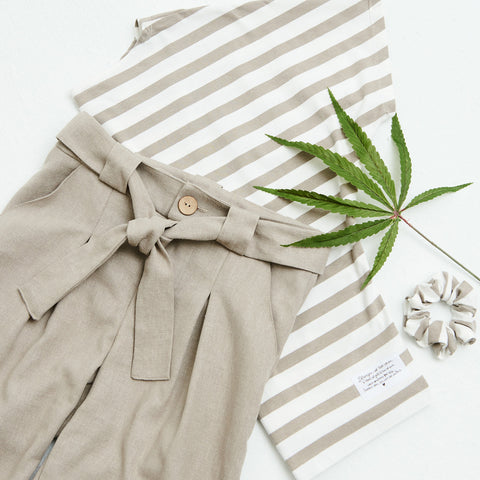10 Eco-Friendly Fabrics for Clothing
More and more, we are hearing about eco-friendly fabrics for clothing design - here and around the world, fashion designers are incorporating planet-friendly fabrics into their collections. However, the question remains: what exactly is an eco-friendly fabric? In this article, we shed light on the definition, as well as the various types of eco-friendly fabrics. From the most practical, ecological and ethical to the easiest to care for.
What Is An Eco-Friendly Fabric?
First of all, it is important to know that the ecoresponsible label of a fabric emphasizes its majority composition of natural fibers. To ensure that an eco-responsible fabric respects a maximum of ecological criteria, the cultivation of the basic product (cotton, bamboo, hemp, etc.) must be controlled by certifications from internationally recognized organizations. For example, good quality organic cotton comes from crops that are 100% free of pesticides and chemicals. In addition, the resources used to manufacture an ecological textile must be renewable and biodegradable. Organic cotton will be GOTS certified when it is certified organic worldwide. Ultimately, the company that designs eco-friendly clothing uses eco-friendly fabrics that are knitted close to the production site. This way, pollution from overseas shipping is avoided.
Organic Cotton
Although standard cotton is also made from a natural material, there are several differences between it and organic cotton. First of all, organic cotton is always grown in an environment free of pesticides, GMOs or chemicals. It is also interesting to know that the production of organic cotton requires 91% less water than traditional cotton production. In fact, organic soil retains water longer due to its higher concentration of organic matter!

Bamboo
Today, hemp is one of the most environmentally friendly fabrics on the planet! From seed to harvest, organic hemp also grows in a controlled environment. The richness of an organic soil allows the fiber to be more resistant to the transformations necessary to create a fabric. Because it is both strong and light, hemp is a fabric that can be used in more than one way, for more than one type of clothing.
Hemp
Today, hemp is one of the most environmentally friendly fabrics on the planet! From seed to harvest, organic hemp also grows in a controlled environment. The richness of an organic soil allows, among other things, the fiber to be more resistant to the transformations necessary to create a tissue. Because it is both sturdy and lightweight, hemp is a fabric that can be used in more than one way, and for more than one type of garment.

Recycled Polyester REPREVE®
REPREVE® recycles phenomenal quantities of materials such as polyester and plastic to create fibers that can be used in clothing design. This is a logical, sustainable, and planet-friendly approach that fits perfectly with the Message Factory! That's why you'll see more than a few of our garments - like our shorts, jackets and skirts - are made from REPREVE® recycled polyester.

TENCEL™
One of our favorite fibers: TENCEL™ is an eco-friendly fabric that many adore. Its power lies in its ethical and eco-friendly design, among other things, but also in its antibacterial properties, softness, heaviness and unparalleled breathability. It's the perfect fiber for creating sleek pieces. Depending on the thickness, TENCEL™ can be worn 4 seasons - and it's known to effectively retain color!
Recycled Cotton And Wool
Recycled cotton is different from organic cotton, but just as environmentally responsible. Specifically, it is made up of conventional cotton fibers that have been reclaimed, sorted and re-purposed into virgin cotton, ready to be dyed, cut and assembled. The same is true for recycled wool. From accessories to clothing, these eco-friendly fabrics promise more than one benefit for the consumer and the planet. Recovering our waste to make new materials is also one of our priorities when choosing fabrics for a collection.
Organic Denim
Like standard denim, organic denim is a fabric of dyed cotton fibers, the basis of the jeans. However, its fibers come from organic soil and environmentally responsible manufacturing methods - just like organic cotton! Softer, stronger and less irritating to the skin, organic denim is a popular choice for eco-friendly clothing producers.
Linen
An undeniable favorite for our summer clothing, linen is a raw material that has been cultivated and manufactured for centuries. Since it is a fiber that is easy to control and requires little treatment to grow properly, linen is and will always be an environmentally responsible fabric.
Mérino Wool
Merino wool is a premium product. Behind every piece is a controlled process, from raising the sheep to shearing the wool. It keeps warm, is incredibly soft, machine washable, biodegradable and has a very low ecological impact (no less!). Merino is a must for ethical fashion designers here, especially for winter collections.
New Fabrics From Seaweed, Coconut, Pineapple, etc.
The market for eco-friendly fabric is really expanding. Fortunately, ethical designers are more and more numerous and so are customers who are looking for fabrics that are healthy for them and the planet. Manufacturers are therefore standing out more and more with new textiles. To meet the demand, they are innovating with fabrics made from pineapple fibers (Piñatex®), coconuts, algae and other types of organic materials.
Where can I find clothes made from these eco-friendly fabrics?
Both in the media and in advertisements, there is a growing number of fashion designers offering clothing identified as ethical or eco-friendly. Do your research and ask for this information if it is not available. At Message Factory, we are pleased to offer collections for all tastes, created and produced locally with exceptional ecological concern; from the cultivation of the fibers at the base of the garment to its delivery to your door. Still not subscribed to our newsletter? Subscribe now and get 15% off your first order!
CTA: Get 15% Off Now
